PIB Headquarters
Seeds of the Future: Clean Plant Programme Gaining Momentum
Transforming Indian Horticulture with Disease-Free Planting Material
Posted On:
21 SEP 2025 9:56AM by PIB Delhi
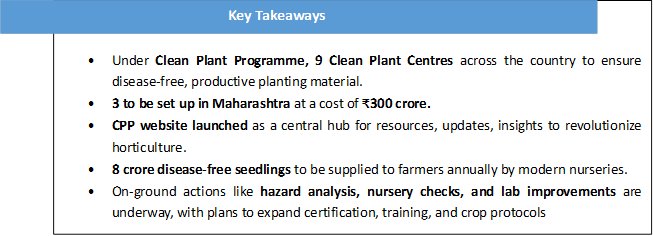
Introduction
There are growing challenges posed by climate change, as well as biotic and abiotic threats to plant health. These challenges directly translate into agricultural losses, reducing farmers’ income and overall productivity. India has invested significantly in boosting farm productivity, yet systemic pathogens (primarily viruses) continue to pose a major threat, causing significant yield losses. These pathogens reduce crop quantity, quality and longevity. By the time symptoms appear, it is often impossible for farmers to manage diseases in the field. Starting with disease-free planting materials has therefore been recognized as the most effective strategy to combat these challenges.
To address this, the importance of preventive measures such as ensuring high standards in seed quality and implementing clean plant programmes- have been widely recognised. Such measures not only safeguard plant health but also come with the added advantage of being free from adverse side effects. Accordingly, on 9th August 2024, the Union Cabinet approved the Clean Plant Programme (CPP) proposed by the Ministry of Agriculture and Farmers Welfare.
Overview: The Imperative for Clean Planting Material
The Clean Plant Programme (CPP) was launched as a major initiative to provide farmers with access to high-quality, virus-free planting material. The National Horticulture Board (NHB) serves as an implementing and executing agency in association with Indian Council of Agricultural Research (ICAR), which oversees technical progress and facilitates capacity building. The initiative involves a significant investment of ₹1,765.67 crore, which also includes an Asian Development Bank approved loan of $98 million in December 2023.
What is CPP?
India’s Clean Plant Program (CPP), conceptualized by the Ministry of Agriculture & Farmers Welfare in collaboration with the Asian Development Bank, is a novel initiative aimed at ensuring healthy, disease-free planting material of key fruit crops. The program seeks to enhance farmers’ productivity and profitability, ultimately boosting India’s global competitiveness.
The initiative has started to take its shape with the following planned developments:
- 9 Clean Plant Centres are to be established across the country to ensure disease-free, productive planting material. Of these, 3 will be set up in Maharashtra at a cost of ₹300 crore—Pune (grapes), Nagpur (oranges), and Solapur (pomegranates).
- Modern nurseries are to be developed, with financial support of ₹3 crore for large nurseries and ₹1.5 crore for medium ones. These nurseries will provide 8 crore disease-free seedlings to farmers every year.
- International cooperation is to be undertaken with countries such as Israel and the Netherlands for implementation of the programme.
- A national-level laboratory is to be set up in Pune for research on original plant species under CPP.
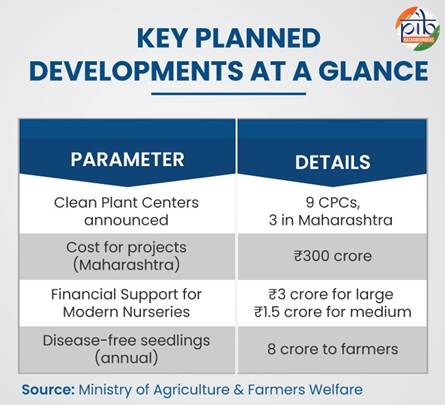
On-Ground Actions and Progress
The following showcase the key on-ground activities undertaken as part of CPP:
- CPP Website Launch: The official CPP website has been launched as a central hub for resources, updates, and insights to revolutionize horticulture in India. The link to the website: https://cpp-beta.nhb.gov.in/
- Hazard Analysis (HA): A critical step in profiling viruses and virus-like agents, forming the foundation for certification and Clean Plant Centers.
- Grapevine: ICAR-IARI (New Delhi) and ICAR-NRC for Grapes (Pune) surveyed key grape-growing regions (Maharashtra, Karnataka, Telangana, Andhra Pradesh, Tamil Nadu, Jammu & Kashmir, Mizoram). A total of 578 samples were tested, completing hazard analysis for grapevine.
- Apple: 535 samples collected from Jammu and Kashmir, Himachal Pradesh, Uttarakhand, and Punjab are under testing, with hazard analysis in progress.
- Citrus: Preparations have begun for hazard analysis, paving the way for healthier, virus-free citrus cultivation.
- Clean Plant Center: India’s first Clean Plant Center is in progress, with the bidding process for its design currently underway.
- Nursery Visits:
- October 23–24, 2024: National Horticulture Board (NHB) and Asian Development Bank (ADB) officers visited grape, pomegranate, and guava nurseries in Nashik and Ahmednagar (Maharashtra) to study nursery ecosystems, design, operations, and cost structures.
- November 18–22, 2024: The same team visited nurseries in Jammu & Kashmir to evaluate apple and temperate crop cultivation practices in cooler climates.
- Lab Assessments: A step towards strengthening of diagnostic and computational capabilities
Between January 16–20, 2025, scientists and officials from ICAR, NHB, and ADB visited public and private laboratories across India. These visits evaluated laboratory capabilities for developing a bioinformatics pipeline for HTS data analysis under CPP. This will help scientists more quickly and efficiently check for virus in many types of crops and better test nursery plants to keep them safe and healthy.
From Source to Soil: Producing Clean Planting Material
The following diagram illustrates the step-by-step process of acquiring, testing, and propagating clean planting material under the CPP:
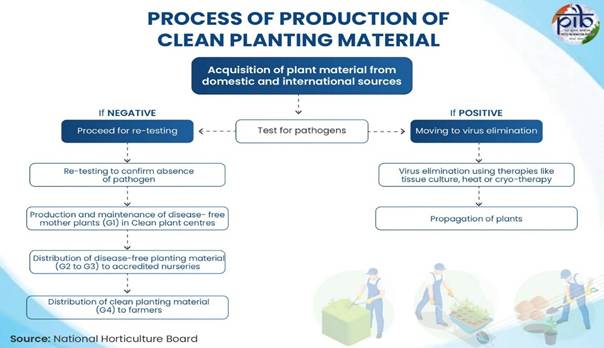
If the acquired plant material tests negative for pathogens, it undergoes re-testing and is then used to produce and maintain disease-free mother plants. These plants provide clean planting material that is distributed through accredited nurseries to farmers. If the material tests positive, virus elimination is carried out using therapies such as tissue culture, heat, or cryo-therapy, followed by plant propagation to ensure disease-free planting stock.
Key Benefits
The key benefits of CPP are as follows:
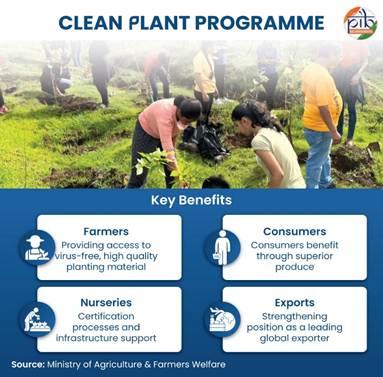
Farmers: Access to virus-free, high-quality planting material, for boosting crop yields and enhancing farmer income opportunities.
Nurseries: Provides streamlined certification processes and offers infrastructure support, enabling nurseries to effectively propagate clean planting material and promote growth and sustainability.
Consumers: Delivers superior produce free from viruses, improving the taste, appearance, and nutritional value of fruits available to consumers.
Exports: Strengthens India’s position as a leading global exporter by focusing on higher-quality, disease-free fruits
Equity and Inclusivity: Ensures affordable access to clean plant material for all farmers, regardless of landholding size or socioeconomic status; actively engages women farmers in planning and implementation by providing resources, training, and decision-making opportunities; and develops region-specific clean plant varieties and technologies to address India’s diverse agro-climatic conditions.
Alignment with other initiatives
CPP is set to boost India’s horticultural sector while aligning with Mission LiFE and the One Health initiatives to promote sustainable and eco-friendly agricultural practices. Moreover, through plant health management, CPP helps farmers adapt to climate change, as rising temperatures not only trigger extreme weather events but also influence pest and disease behaviour.
Mission LiFE (Lifestyle for Environment)
An India-led global mass movement to nudge individual and community action to protect and preserve the environment. Introduced by PM Narendra Modi at COP26 in Glasgow on 1st November 2021, it draws from India’s rich cultural heritage, which promotes conservation of natural resources and harmony with nature. It seeks to channel the efforts of individuals and communities into a global mass movement of positive behavioural change.
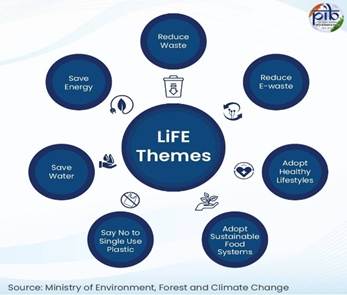
National One Health Mission
One Health is a multidisciplinary approach that unites human, animal, and environmental health sectors to solve the health, productivity, and conservation challenges. In India, with its one of the largest livestock populations, diverse wildlife, dense human population, and diverse flora, there are both opportunities for coexistence and risks of disease spread. Events like the COVID-19 pandemic, Lumpy Skin Disease in cattle, and Avian Influenza highlight the need to look beyond human health and include livestock, wildlife, and the environment. By leveraging the strengths of each sector, One Health promotes integrated and agile responses to achieve the goal of ‘Health and Wellness for All. The Prime Minister's Science, Technology, and Innovation Advisory Council (PM-STIAC), in its 21st meeting, approved setting up the National One Health Mission.
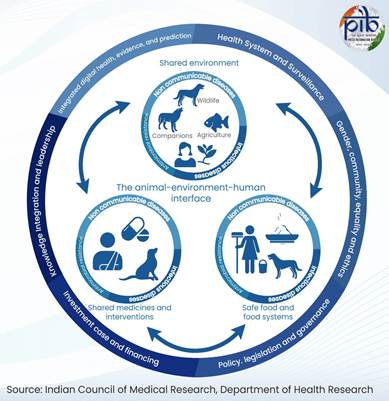
Policy Alignment: CPP and MIDH
The Clean Plant Programme complements the Mission for Integrated Development of Horticulture (MIDH)- a centrally sponsored scheme, launched in 2014–15 for holistic growth of horticulture sector.
Quality planting material and micro-irrigation are among the key components under MIDH in boosting productivity of horticulture crops from 12.10 MT/ha in 2019–20 to 12.56 MT/ha in 2024–25 (2nd advance estimates).
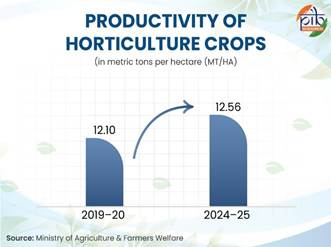
Conclusion
The Clean Plant Programme is progressing, with actions already in motion and planned developments set to accelerate its reach and impact. Looking ahead, CPP is set to advance further with concrete on-ground actions — including wider consultations with nurseries for certification; development of training programmes for relevant authorities, preparation of a hazard analysis protocol for citrus, diagnostic protocols for mango, guava, litchi, avocado and dragon fruit; and the release of matching-grant and cost-norm guidelines for nurseries. CPP is no longer a vision — it is emerging as a transformative step to strengthen India’s horticulture, empower farmers, and help the sector truly bloom.
References: -
Government of India
Office of the Principal Scientific Advisor to the Government of India
Ministry of Environment, Forest and Climate Change
NITI Aayog
National Horticulture Board
Indian Council of Medical Health Research
PIB Press Releases
PIB Backgrounder
Seeds of the Future: Clean Plant Programme Gaining Momentum
*****
SK/SM
(Release ID: 2169147)
Visitor Counter : 1890